About this analysis
After 10 minutes, I hated Grandia II. It began abuseing every JRPG trope I could imagine and only got worse from there. Yet, I realized it also created a very solid plot structure with well-paced ups and down. For this dichotomic reason, I found it particularly intriguing to break down narratively. I have also never analyzed a game story in such detail before, so this is a good exercise for me as well!
This piece is perhaps not as deep as it could be, but there was a lot of ground to cover (and a lot of things I am myself just learning). I will try to point out important archetypes, conflicts and plot points to understand how the story flows in the first 6 or so hours. At the end I also provide a bullet-point breakdown of the plot for your convenience!
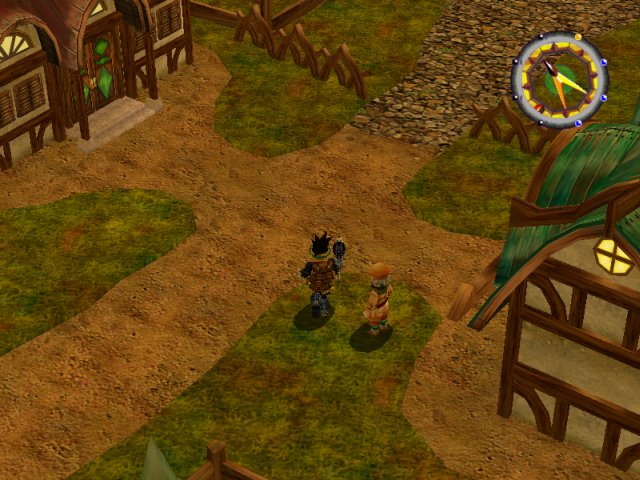
Opening
From the intro cinematic we learn of the ancient battle of Good vs. Evil (Lord Granas vs. Valmar) and see a group of nuns en-route to unexplained ritual. We meet the archetypal I-don’t-care protagonist Ryudo. He is a Geohound, a mercenary-for-hire known for his cold-blooded lack of empathy, nonchalant attitude, and slaying lots of monsters. A note informs him of an escort job in nearby village, and so begins the first “dungeon” section where you fight generic animals in a forest. Riveting. After that, you leisurely explore the town, buy some items, and rest at the inn.
The word that comes to mind is boring. The cliche battle of good vs. evil which will inevitable need to save the world from, the stereotypical one-dimensional I-don’t-care protagonist, and a tedious slog through low-level battles followed by a tiny village. Typical JRPG fare for sure, but one that fails to grab or motivate you in any way.
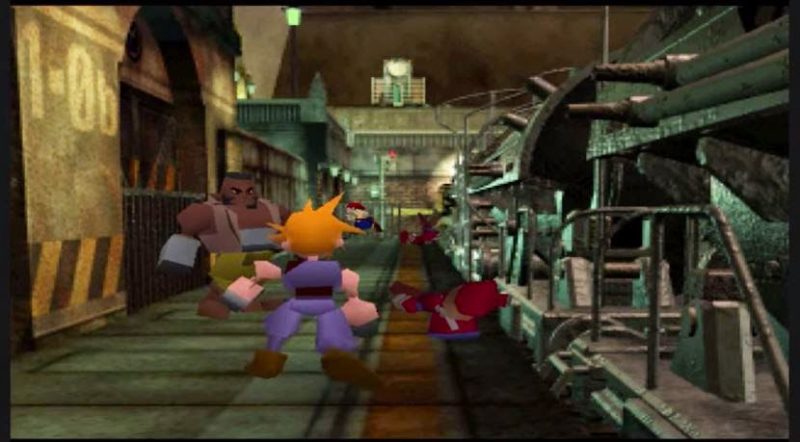
Thinking about this, I must make a nod towards the Final Fantasy series which have terrific openings in spite of the tropes. Final Fantasy 6 begins with a moody walk in giant power armors via snowy mountains before dropping you in your first village. It feels atmospheric and intriguing. Final Fantasy 7 drops you right into the action, with a terrorist bombing mission of a power reactor (even more relevant in contemporary days). Even tho the protagonist appears equally flat I-don’t-give-a-crap mercenary and the second lead is a stereotypical “big black guy” with a gun for an arm, at least the action keeps you captivated. Lastly, Final Fantasy 9 begins with a kidnapping of a princess, again throwing you right into the action with slightly more multi-dimensional cast.
Protagonist and the girl
After exploring the village you meet the village priest and Elena, the second lead character and anti-thesis of Ryudo. She is good and kind-hearted. The two instantly start bickering and personal conflict begins. Your mission is to escort her to an ominous tower for unexplained reason. While continuing the cliche of unexplained mystery in true JRPG fashion, at least this creates some intrigue.
The next dungeon section begins, this time featuring some simple puzzles. The two leads continue bickering (personal conflict escalates), until you reach the tower where Ryudo must wait outside, once again failing to get an explanation. Naturally, things don’t go as planned at the evil tower and Ryudo rushes in to help. Another dungeon section with more intricate puzzles begins as you learn everyone is dead and Elena surrounded by evil spirits. Ryudo quickly grabs her and makes an escape. Surprisingly, there is no boss battle… yet.
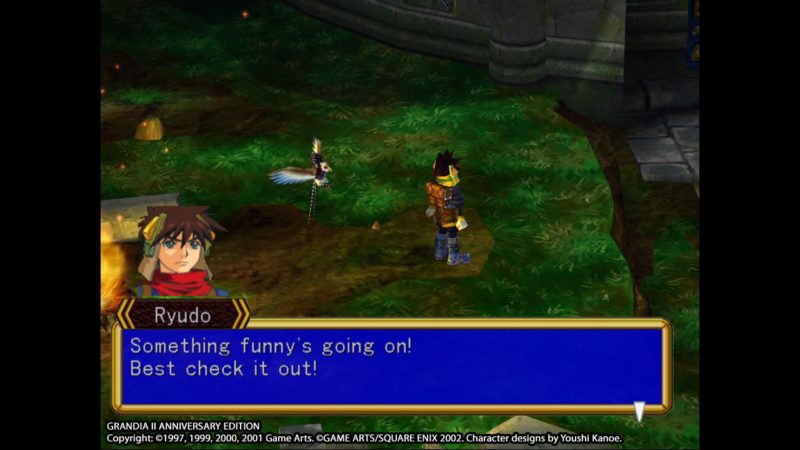
Back in town, the priest finally explains that the ritual was an exorcism to expunge / seal the Valmar’s evil (initial mystery solved, introducing new questions), which failed and the demonic forces are now on the loose. And we meet the second female lead.
Fan service and end of first act
Millenia, a big-breasted scantily-dressed woman with demon wings, appears and attacks the town. In a semi-boss battle you are scripted to lose, she traps Ryudo and destroys parts of the city. All featuring plentiful cleavage shots and cutesy voice that utters “kawaii” within the first minute. Fan service galore.
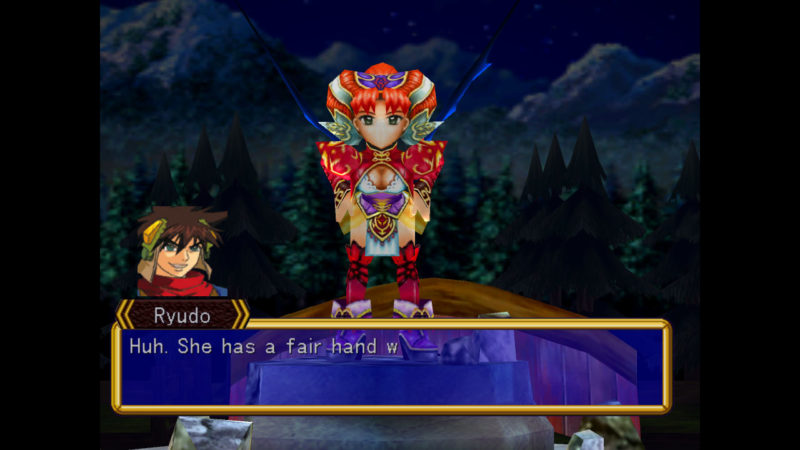
Fulfilling her dark needs, Millenia disappears and the priest further explains Elena has been possessed by the evil, and now you must venture a long way to escort her to a cathedral for cleanings.
Thus, the main cast is introduced and the main “quest” that will drive the narrative explained. The first act is over.
Personal conflict climax
After the heated story segment comes reprise in the form of a brief dungeon section through a mountainy region (with yet more complex puzzles). The party stops to make camp, where Ryudo and Elena’s bickering reaches a climax. She storms off into her tent. Alone, Ryudo speaks with his bird-shaped friend (who often provides criticism of the lead and a sounding board for character development. Ryudo explains how he genuinely wants to help, thus finally revealing a softer side. The character is gaining a new dimension. Elena overhears the chatter and changes her mind about Ryudo.
This is a crucial moment in the plot where we finally see the “good” side of a “bad” protagonist, and a complete shift of the relationship with potential love interest. Their personal conflict is now resolved and transformed, slowly turning positive.
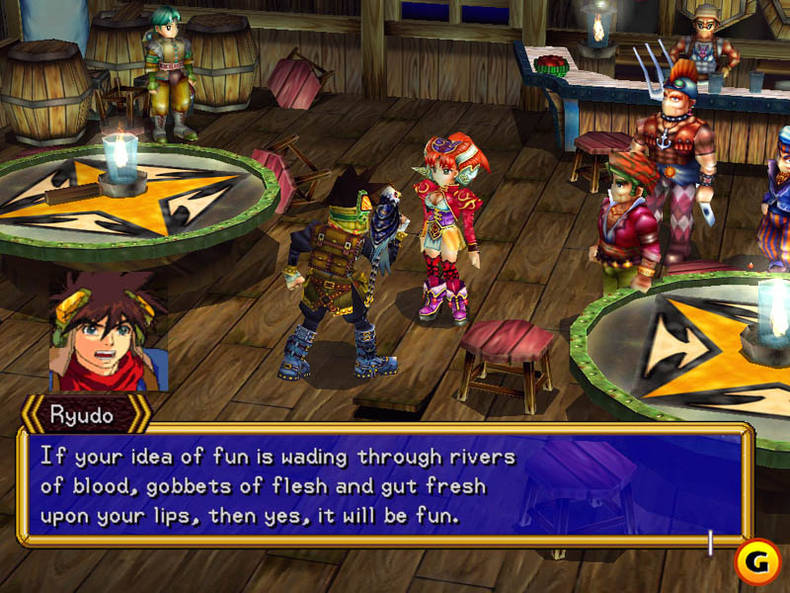
Second Village and Story Structure
Upon reaching Agaer town, you learn it has been ravaged by monsters (in a true rpg fashion). This is an important structure that will continue on – every time you find a town, it has one problem for you to resolve via a dungeon and boss battle before you can move on. Naturally the nonchalant Ryudo resist as kind-hearted Elena urges people must be helped. This highlights their opposite attitudes.
In the Inn, you meet a young boy Roan who lost his mother’s medal in the village, and Ryudo refuses to help. At night, he changes his mind (arguing he needs the money), as Millenia once again appears, traps him and… joins the party. I cannot understand why any of this makes sense, except for her countless flirtatious references to Ryudo as cute. More fan service?
(Note: this actually starts to make sense later on as you learn who Millenia really is – a repressed dimension of the polite and conservative Elena)
Downstairs, you learn the boy Roan eloped to the monster cave alone (of course) and you must rescue him. After this story high point comes another break of dungeon exploration with escalating puzzles. You find Roan and he joins your party for the final boss battle. At the end, Millenia unleashes her most devastating attacking, showcasing the true power of her evil side. She then transforms back to Elena, revealing the two are connected. Important character development point for both of these.
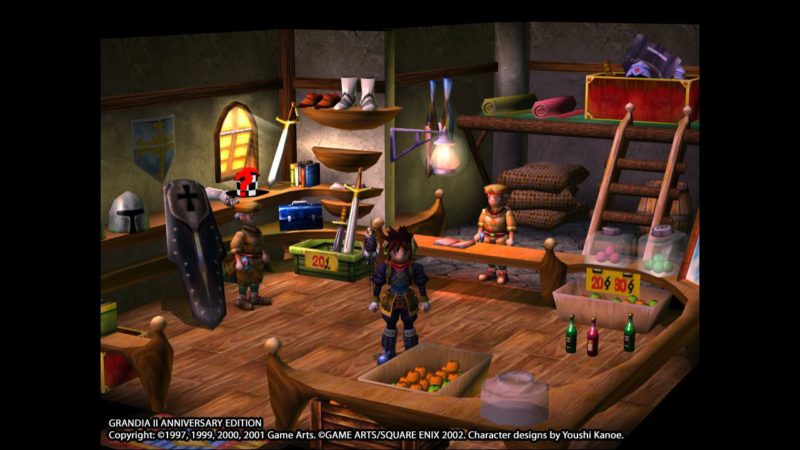
The town is saved and everyone rejoices. Before departing, the young boy joins your party on the dangerous mission. Once again, a completely irrational occurrence permissible only in the world of JRPGs.
Plot thickens and personal motives for protagonist
After some more monsters-and-puzzles, you set up camp and are attack by a powerful but slowly speaking brute Margo. You learn he confused Ryudo for Melfice, his arch nemesis who turns out to be Ryudo’s brother. Now, the story introduced a new plot point that serves as Ryudo’s personal motive for wanting to continue the journey. Little is revealed about his past with Melfice, hinting only some bad stuff happened, so the intrigue keeps you engaged.
Third Village and more plot development
In the commercial and techy city of Liligue, no one can eat. This is the village’s problem. From the priest, you learn it was built on ancient ruins you must venture to in order to uncover the mystery. Mareg re-appears and joins your party, which this time at least makes sense due to mutual goals and Ryudo’s personal reason for wanting to find his brother.
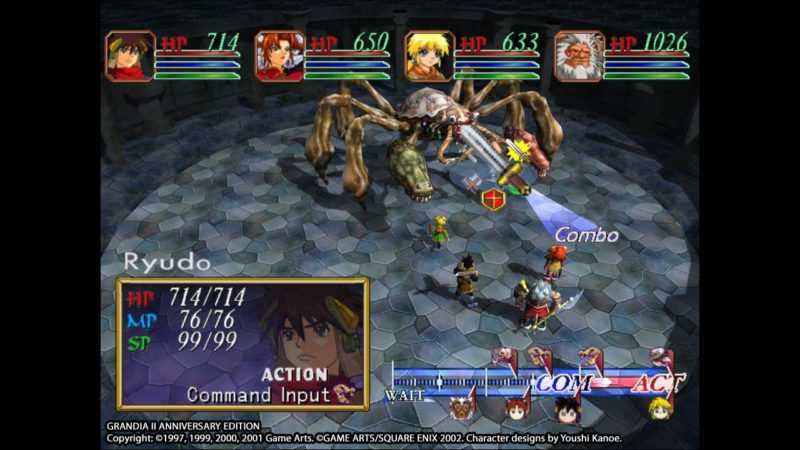
Yet more dungeon and puzzles later, you reach the boss as Elena turns to Millennia for the battle. The monster, called Valmar’s Tongue appears to be some spawn of the great evil, hinting the dark lord himself is making a comeback. Themes of gluttony are apparent, perhaps hinting the great evil alludes to the 7 deadly sins?
At the end of the battle, Millenia gleefully absorbs some sort of spirit orb of the monster, showing her evil side yet again. She transforms back to Elena, and the part learns the villagers can eat normally. Yay, the village is again saved and you continue on.
You take the state-of-the-art Skyrail and, predictably, things do not go so well, sending you crashing to unknown frosty lands. Plot twist that serves to stall our party’s journey.
Summary
This is as far as I got. To sum up, the protagonist is an archetype that slowly reveals more dimensions and changes over time. The conflict with the love interest also escalates until climax, and slowly transforms in a positive direction. Finally, new characters, past events and thematic motifs are slowly introduced to enrich the experience and flesh out the characters.
The pacing and structure is almost perfect, hitting on the beats at the right times. The plot points slowly reach an almost boiling point followed by a resolution. The release of tension is further augmented by a period of monster fighting, village exploration, and leveling up your party, which takes your mind off of the main story completely for a bit (a needed mental break).
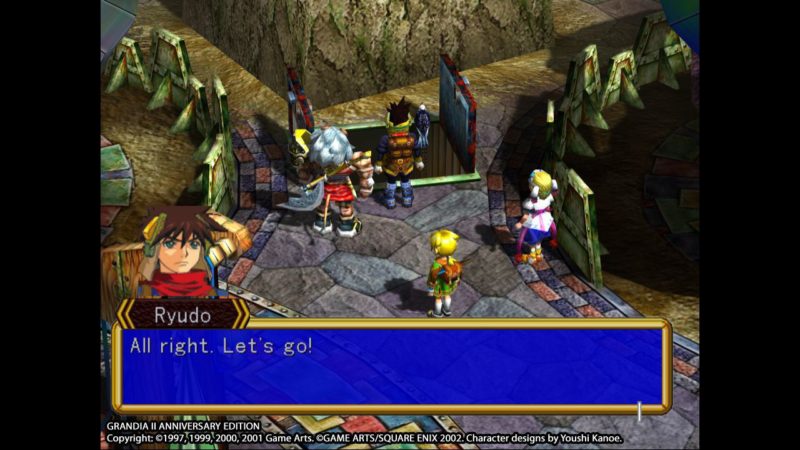
The “one village, one problem, one dungeon setup” also works great to keep things succinct without overwhelming the player. Wandering around the town you learn a lot about what is bothering the denizens and eventually how to fix the issue. It creates a solid framework for fleshing out the characters and dripping new main story segments in a linear fashion. Contrast this with old-school CRPGs like Baldur’s Gate or Planescape Torment, which throw you into a huge city with countless quests, characters, and nooks-and-crannies to explore. Very different approaches achieving different goals (linear story vs. open world).
I hope this little analysis is as useful for you as it was for me. As a game designer with few years experience, I am still fairly new to the writing part. Taking a deeper look at how Grandia II structures its plot in spite of my own reservations due to its hockeyness was a great learning exercise for me!
Lastly, you can buy Grandia II on GOG for around $20 if it piqued your interest. It’s actually pretty fun, now that I accepted its hockey nature!
Below is a slightly more detailed bullet list of the key game events, if you’re curious:
Opening
- Cinematic of battle of Good vs. Evil (Lord Granas vs. Valmar)
- Ryudo introduced completing first job and finding next assignment
- Make way to town [Dungeon]
Carbo Village [Village]
- Go to Church, meet Elena, initial conflict as Ryudo is mean and condescending [protagonist vs. love interest]
- Speaking to priest, you must escort her to a tower for an unexplained ritual
Black Forest [Dungeon]
- Ryudo and Elena continue bickering as they Depart [protagonist vs. love interester conflict deepens]
Garmia Tower [Story]
- Generic spooky “something is evil here” tower (motif)
- Told to wait outside with no explanation (mystery)
- Inexplicably something goes wrong, Ryudo rushes in
Garmia Tower Inside [Dungeon]
- Fight monsters and make it to top of tower, everyone is dead (drama deepens)
- Elena is unconscious and something evil happened to hear (ambiguous)
- Escape tower (surprise: no boss battle)
Carbo Village [Story]
- Incomplete Explanation of the ritual (something something evil forces)
- Interrupted by Millenia, a barely-clothed, big-breasted demon girl who utters “kawaii” within the first minute… basically fanservice
- Battle with Millenia, you lose, she destroys town and disappears
- Preast tells you Elena has been infected with evil, new mission to go to Cathedral to save her
Inor Mountains [Dungeon]
- Plowing through monsters, Elena becomes a party member in combat
- Introduction of few simple puzzles (see-saws pushing rocks down the cliff)
Camp [Story]
- Ryudo and Elena bicker as she angrily returns to tent (conflict climax)
- Ryudo alone talks to his bird friend about wanting to help (rude protagonist reveals soft side)
- Elena overhears, changers her attitude (relationship begins turning positive)
Agear Town [Village]
- Talking to people: learn village destroyed by monster (village’s motif / quest setup)
- Inn Cutscene of a small boy Roan berated by a group of adventurers for losing a medal in the town
- Roan pleads for Ryudo to help but he refuses
- Later at night when Elena sleeps, Ryudo decides to help Roan (reveal of soft side 2)
- Millenia Appears again, traps Ryudo and taunts him
- For inexplicable reason, she decides to join and help him. Only real explanation are her countless references to how cute he is
- Learn Roan left to the monster cave alone, follow after him
Durham Cave [Dungeon]
- New puzzles with switches and bridges
- Find Roan who joins your party
- Boss battle: Millenia unleashes her most devastating attack (show of power)
- Millenia transforms back to Elena, revealing the two are connected
Agear Town [Village]
- Roan joins party for no real reason than proving using (JRPG trope)
- Mission to Cathedral continues
Baked Plaine [Dungeon]
Grana Cliffs[Story]
- See the Granacliffs, a stunning vista and landmark of the land
- Mareg, a powerful but slowly-speaking beast attacks party
- Mareg explains he smelled his arch-nemesis Melfice, Ryudo’s brother (new plot point, drama increases)
Liligue City [Village]
- Talking to people: learn people cannot eat (village’s motif / quest setup)
- Ryudo does not want to waste time but Elena insists they must help (good-hearted Priest trope)
- Learn from priest city was built on ancient ruins you must now explore
- Before entering Mareg appears and joins your party (mutual goals, Ryudo intrigued by his brother’s involvement)
Liligue Cave [Dungeon]
- Puzzles get more complicated
- Boss: Valmar’s Tongue, a piece of the great evil that was hunting the village. Theme of gluttony
- Elena switches to Millenia for battle, then absorbs piece of defeated boss (showing evil side), turns back to Elena
Liligue City [Village]
- People can eat normally again
- State-of-the-art Skyrail is usable, but enroute it crashes into the lands below
Book imaged in header by Reid from OpenGameArt.org